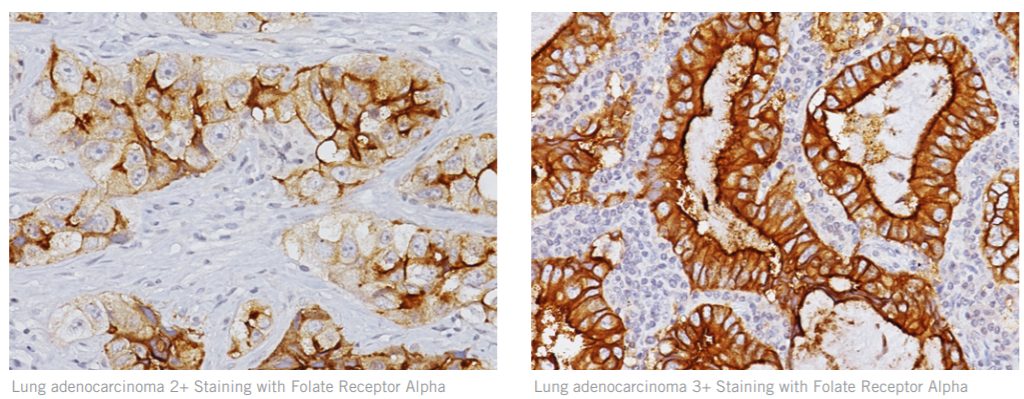Harnessing the Power of Folate Receptor Alpha for Anti-Cancer Therapies
Folate, a B vitamin, is an essential nutrient in the body. Folate is found naturally in foods and can be absorbed through use of a dietary supplement (folic acid). A sufficient intake of folate is needed, as it’s necessary in rapidly proliferating cells for the one-carbon metabolic reaction and DNA biosynthesis, repair and methylation.1 Folate can be transported across the cell membrane through three ways – reduced folate carrier, proton-coupled folate transporter, and folate receptors.1 Folate receptor α (FRα) is expressed in low levels in normal human tissue, such as kidney and lung, but is overexpressed in many cancers of epithelial origin; namely, ovarian cancer, thyroid cancer, nonsmall cell lung adenocarcinoma (NSCLC) and endometrial cancer, making it an attractive receptor for anti-cancer therapies.
The overexpression of FRα in solid tumors may contribute to cancer development in different ways. Studies have suggested parallel roles of FRα in both cell growth regulation and signaling functions.1 It has been reported that after folate uptake and internalization, FRα can translocate to the nucleus, where it can act as a transcription factor. Through this mechanism, FRα may directly regulate the expression of key developmental genes in cancer cells. Furthermore, folate uptake can advance cancer cell proliferation, migration, and loss of adhesion through downregulation of E-cadherin, the cell adhesion molecule, promoting cellular motility and metastasis.1 Recent studies suggest FRα may function not only as a folate transporter, but also as a signaling molecule, contributing to cancer growth and malignancy.2 In the most widely studied tumor, epithelial ovarian cancer, expression of FRα increases with tumor stage3 and is associated with decreased survival. 4 However, in NSCLC, FRα has been shown to be specific for adenocarcinomas relative to squamous cell carcinoma and other histologic subtypes and increased expression has been correlated to increased survival.5,6
FRα has recently been an attractive target for diagnostic and therapeutic tools and can be developed for predictive biomarker research. Using FRα, anticancer therapies can better localize target tumors using methods such as antibody–drug conjugates, small-molecule drug conjugates, radioimmunoconjugates. Several ongoing clinical trials are currently testing the efficacy of these routes. Early phase clinical trials are also exploring how FRα may be targeted by chimeric antigen receptor T cells, which could further improve the outcomes of patients with FRα-overexpressing cancers.7
FRα expression can been examined by several methods including immunohistochemistry (IHC). Biocare Medical offers a prediluted mouse monoclonal anti-human Folate Receptor α antibody [26B3.F2] for IHC applications. This antibody demonstrates high specificity as itstrictly recognizes the alpha isoform of folate receptor.

If your lab is interested in Folate Receptor α and would like to learn more about this antibody, please call Biocare at 800-799-9499 or visit our website: https://biocare.net/product/folate-receptor-alpha-antibody/.
1. Cheung, A. et al. Targeting folate receptor alpha for cancer treatment. Oncotarget. 2016 Aug 9; 7(32): 52553–52574.
2. Vergote IB, Marth C, Coleman RL. Role of the folate receptor in ovarian cancer treatment: evidence, mechanism, and clinical implications. Cancer Metastasis Rev. 2015;34:41–52.
3. Toffoli G, et al. Expression of folate binding protein as a prognostic factor for response to platinum-containing chemotherapy and survival in human ovarian cancer. Int J Cancer. 1998 Apr; 79(2):121–6.
4. Choi SW, Mason JB. Folate and carcinogenesis: an integrated scheme. J Nutr. 2000; 130(2):129–32.
5. Xia W, et al. A functional folate receptor is induced during macrophage activation and can be used to target drugs to activated macrophages. Blood. 2009 Jan; 113(2):438-46.
6. Matherly LH, Goldman DI. Membrane transport of folates. Vitam Horm. 2003; 66:403-56.
7. Scaranti, M. et al. Exploiting the folate receptor α in Oncology. Nature Reviews Clinical Oncology. 2020; Volume 17, 349–359

